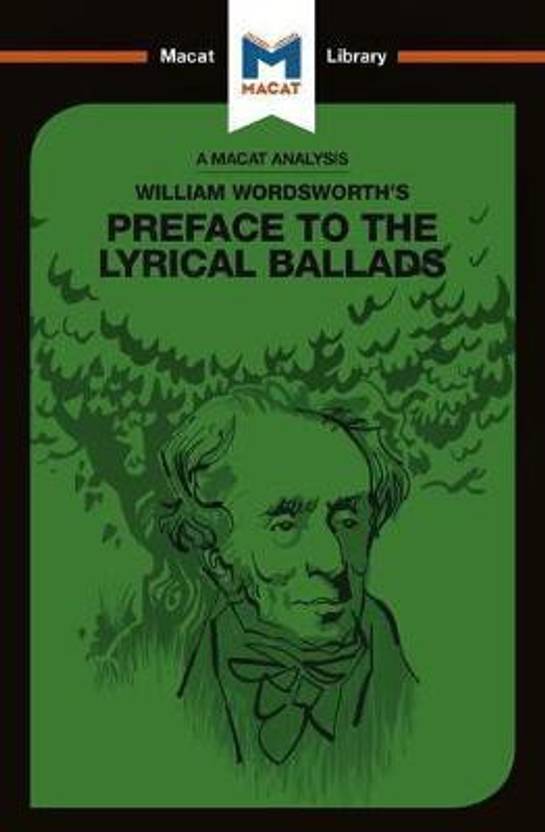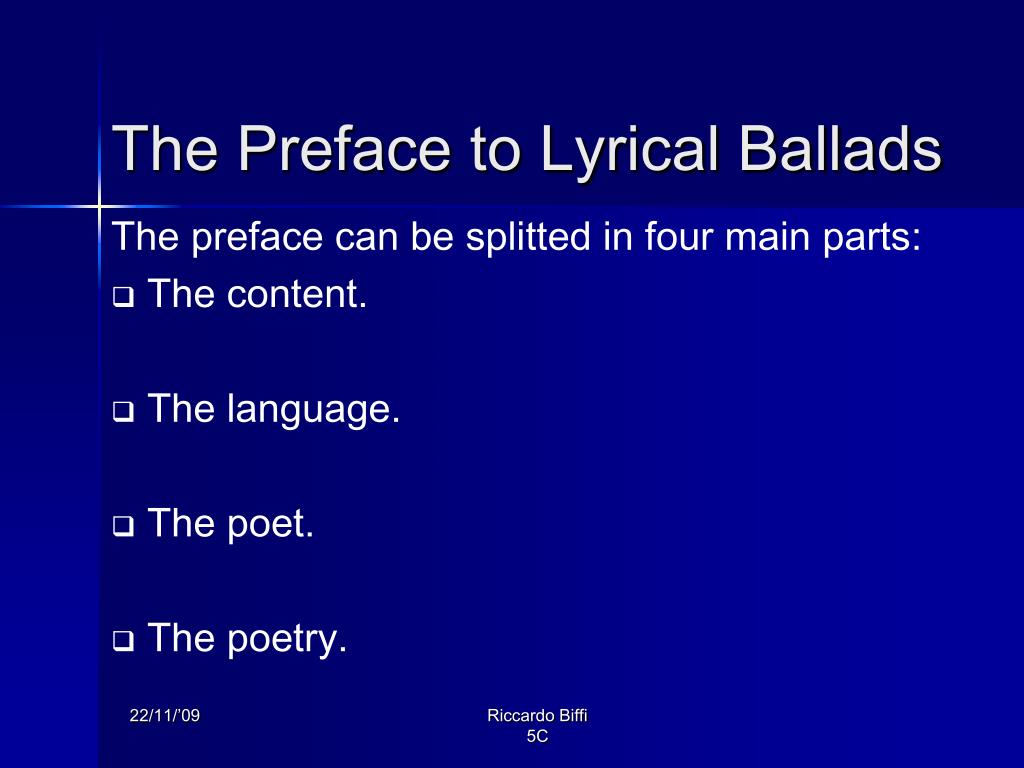
Preface to Lyrical Ballads by William Wordsworth summary in Hindi Thinking Literature UGC
Analysis. Last Updated September 5, 2023. In order to better understand the views Wordsworth expresses in his preface to Lyrical Ballads, it is helpful to be familiar with Wordsworth's long.

Preface to the Lyrical Ballads by William Wordsworth Summary British Literature 2 MA Semester 1
Preface to Lyrical Ballads. This page is found under the author, William Wordsworth. However, as many understand, the Lyrical Ballads was a collaborative effort. Both Wordsworth and Samuel Taylor Coleridge were inspired to produce this book of poetry through many intellectual conversations. Only four poems in Lyrical Ballads are written by.

Preface To Lyrical Ballads Analysis PDF William Wordsworth Romanticism
Analysis: "Preface to Lyrical Ballads". Wordsworth opens his essay by acknowledging the recent publication of his collection of poems Lyrical Ballads. He had anticipated, correctly, that the book would divide the public into those who loved the poems and those who hated them; his only surprise has been that even more people have liked the.

PREFACE TO LYRICAL BALLADS TEXT ANALYSIS 3 YouTube
Central to the creative process of the Romantic poets that followed him, Wordsworth's Preface to the Lyrical Ballads has been both a gift and a thorn in the side of critics for over a century. Readers find themselves drawn back to the essay repeatedly as they seek to untangle the ideas and contradictions within it. The Preface is a statement.

Preface to the Lyrical Ballads by William Wordsworth YouTube
Lyrical Ballads. The Preface to Lyrical Ballads is an essay, composed by William Wordsworth, for the second edition published in 1800 of the poetry collection Lyrical Ballads, and then greatly expanded in the third edition of 1802. It came to be seen as a de facto manifesto of the Romantic movement. [1] Key assertions about poetry inclue include:

Notes and summary of THE PREFACE TO LYRICAL BALLADS BY WILLIAM WORDSWORTH. YouTube
Ramkrishna Bhattacharya. William Wordsworth's "Preface" to the second edition (1800) of Lyrical Ballads (first published 1798), subsequently revised and enlarged several times, is still considered by many to be the manifesto of the Romantic Movement in England. A manifesto of a new movement is expected to offer at least a few original ideas.

Preface To Lyrical Ballads by William Wordsworth in Bengali Summary Explanation and Analysis
While artful shades thy downy couch enclose, And soft solicitation courts repose, Amidst the drowsy charms of dull delight, Year chases year with unremitted flight, Till Want now following, fraudulent and slow, Shall spring to seize thee, like an ambush'd foe. 5. From this hubbub of words pass to the original.

(DOC) Preface to lyrical ballads Critical Analysis Zeeshan Ansari Academia.edu
William Wordsworth's "Lyrical Ballads" which was penned in association with S.T Coleridge turned out to be a milestone work in the history of English literature. In his "Preface to Lyrical Ballads" Wordsworth propounds his concept of poetry, the subject and theme of poetry, the purpose and function of poetry, and the language fitted for poetry.

(PDF) Preface to Lyrical Ballads reexamined
Discussion of themes and motifs in William Wordsworth's Preface to Lyrical Ballads. eNotes critical analyses help you gain a deeper understanding of Preface to Lyrical Ballads so you can excel on.

Ssummary of Preface to Lyrical Ballads PDF Poetry Pleasure
Summary. The Preface to Lyrical Ballads by Wordsworth and Coleridge appeared after the first publication of the poems and then in numerous revised forms until the end of Wordsworth's career. It remains the clearest statement of Romantic principles as it lays out the purpose and practice of writing poetry and its close relation to prose.

WordsworthPreface To The Lyrical Ballads PDF William Wordsworth Ballad
William Wordsworth. William Wordsworth, a poet and one of the foremost founders of English Romanticism, is the author and narrator of the essay "Preface to the Lyrical Ballads.". Through the essay, Wordsworth criticizes the literature of Neoclassical… read analysis of William Wordsworth.

An Analysis of William Wordsworth's Preface to The Lyrical Ballads Buy An Analysis of William
Lyrical Ballads is a collection of poetry by William Wordsworth and Samuel Taylor Coleridge that was originally published in 1798. Wordsworth's preface to this collection was composed for its.

(PDF) Preface to Lyrical Ballads Maram El jam Academia.edu
Summary: "Preface to Lyrical Ballads". "Preface to Lyrical Ballads " is an essay by the English Romantic poet William Wordsworth. In 1798 Wordsworth wrote, with Samuel Taylor Coleridge, the poetry collection Lyrical Ballads. Believing that the poems were so novel in theme and style that they required some explanation, Wordsworth wrote a.

Preface to Lyrical Ballads Summary Wordsworth "Theory of Poetry" Poetic Process Poetic
This chapter follows the principles outlined in the introduction by responding to the three early editions (1798, 1800, 1802) of Lyrical Ballads as a combined totality: three parts that make up one whole. It uses the historicity provided by the reception of the 'Preface' in each of the three parts to pull out defining features of response to the volume in its own time.

PPT The Preface to Lyrical Ballads PowerPoint Presentation, free download ID5577931
Wordsworth wrote the "Preface to the Lyrical Ballads" during a time where England was experiencing profound urbanization, industrialization, and movement towards mass media and mass culture. In the essay, Wordsworth expresses fear that these factors can lead human minds to become dull, and thus advocates a poetic revolution.

Preface to Lyrical Ballads Lecture 3 ( Wordsworth on Poet Part 1) YouTube
His Preface to the Lyrical Ballads became the symbol and the instrument of romantic revolt. Wordsworth's philosophy of life, his theory of poetry, and his political credo were all intricately connected. A change in one characteristically brought parallel changes in the others. In 1793, the poet found himself without a penny, banished from the.
- Baris My Home My Destiny Chi è
- Confezione 3 Ovetti Kinder Prezzo
- Gabry Ponte La Danza Delle Streghe
- Disegni Di Cartoni Animati Facili
- Nomi Dei Sette Colli Di Roma
- Cronaca Cremonese Modena Fc
- La Vita è Davvero Breve Traduzione
- Foto Di Tutte Le Bandiere Del Mondo
- Come Si Chiama Fiorello Di Nome
- Località Di Una Tragica Ritirata Francese